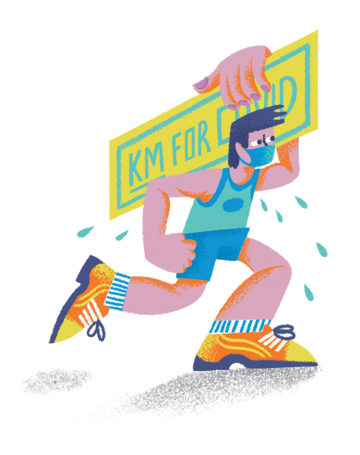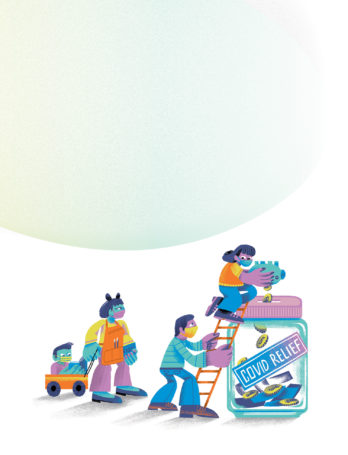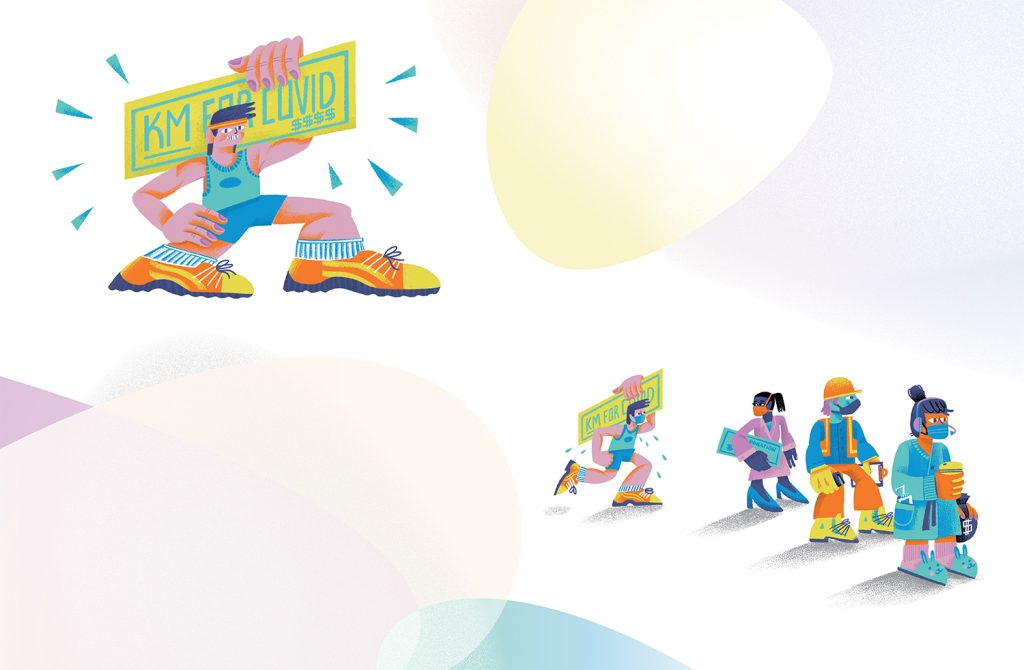It’s been nearly a year since the COVID-19 pandemic upended the world in many ways. In the 12 months since ‘Coronavirus’ became part of our daily lexicon, everything from the ways we get around, to the ways we work, gather and celebrate has changed. As public-health measures evolved throughout the last year, many local charities found themselves facing gaps in services and funding as a result of increased and changing demand for services.
The uncertainty of last year was challenging for many, yet Edmontonians came together in community spirit to support their neighbours in need. Whether giving their savings from a piggy bank or using an employer-matching donation program, these Edmontonians stepped up to make a difference by contributing to Edmonton Community Foundation’s (ECF) COVID-19 Rapid Response Fund. What’s more, many of these early donors to the Rapid Response Fund were able to take advantage of a matching program provided by the Alberta government, increasing the impact of their contributions.
Individual donations
When fitness centres and gyms closed down in the early days of the pandemic, Kyler Costucci found himself looking for new ways to stay active and healthy. As a young professional with a passion for healthy living, he knew that staying active was an essential way for him to manage the increased stress and challenges brought on by the pandemic. With temperatures warming, Costucci turned to the great outdoors and took up a new hobby: running. One day while out on a run, Costucci had an epiphany. What if he could use his newfound hobby as a force for good?
“I was just thinking about everything that was going on and what I could do about it. I kind of thought back to when I was younger and we did things like the Terry Fox Run, and just, this idea came to me very powerfully that maybe I could do a fundraiser and use it to help people in need. I’m a faith-based person and it just felt like God put this idea in my heart of how I could help,” he says. “So I went home, I found ECF online and saw the kinds of things this fund was supporting, and that was it.”
Almost immediately after learning about ECF’s COVID-19 Rapid Response Fund, Costucci reached out to his networks via social media. He called his initiative “KM for COVID,” with the goal of running every day from April 20 – May 20, 2020. Over that time, and despite suffering an injury, he ran 137 km, finishing the 30th day of his campaign by running his first ever marathon. He raised more than $1,000 for the fund. Although he was pleased with the amount he raised, Costucci notes that his efforts were about more than just raising a specific dollar value.

“I knew that the money would be great in terms of a contribution to the fund, but I think the real impact I wanted to have was in raising awareness of what we can all do at a personal level,” he says. “If we all make a small contribution, compounded over time with a whole bunch of other people, that’s where the actual progress comes in.”
Corporate giving and community investment
Edmonton-based corporations also saw ECF’s COVID-19 Rapid Response Fund as a way to support local organizations that faced increased need as a result of the pandemic. While corporations like EPCOR and Capital Power were already well aware of the importance of community investment, they recognized the immediate and unprecedented need many community members faced in the wake of the pandemic.
EPCOR, which contributed $150,000 to the fund, has long understood the value of community. As the full impact of the pandemic became clearer, EPCOR stepped up its efforts to support Edmontonians hardest hit by the pandemic by investing in community programs such as ECF’s Rapid Response Fund to help Edmontonians in need.
“This donation was provided to address the immediate and long-term community needs related to the pandemic,” said Stuart Lee, EPCOR President and CEO. “Edmonton Community Foundation was well-positioned to do more to help community charities deal with urgent needs resulting from the pandemic, including providing food hampers, youth-support workers, digital mental health-supports and more.”
Capital Power also recognized the increased need for community support as a result of the pandemic. In late April, the company launched a two-week employee-giving campaign to support COVID-19 community relief. Employee contributions to the campaign, which totalled $40,075, were matched and topped up by Capital Power for a total donation of $101,813.
“We want to contribute to the communities where we work and operate — that’s something we would be doing in any year, and we’re proud that our employees take that step as well,” said Sian Barraclough, Vice President of Strategy and Sustainability with Capital Power. “As a company providing essential services, we’re very fortunate that our jobs haven’t changed through the pandemic, but we recognize that’s not the case for everyone and we wanted to make a difference in the lives of those in our community who were most affected by COVID-19.”
Individual donors
At just seven years old, Raina Shah might be among the youngest donors to support community relief efforts in the wake of the pandemic. But for the Shah family, charitable giving is a family value, instilled from a young age.
“We’re immigrants — we just came to Canada 15 years ago, so we know struggle and difficulty,” says Dhaval Shah, Raina’s father. “I’m self-employed, and when I started my insurance business back in 2009, I decided to give back to the community and support other people in whatever way I can.”
Dhaval had long hoped to instill the values of community and charitable giving in his two young children, Kevin and Raina. He was pleasantly surprised when his youngest, Raina, suggested she wanted to make a difference. When she saw a story about people in need during the pandemic, Raina turned to her father and suggested she wanted to donate the contents of her piggy bank to help. Kevin has also donated his savings to local charity during COVID-19.
“I did some chores and my parents gave some money for my birthday and I was saving up for some toys like dolls and Lego,” said Raina. “But I wanted to help the people in need and make them smile.”

Dhaval began looking for community organizations working to specifically address the needs brought about by the pandemic. When he learned about the COVID-19 Rapid Response Fund, as well as the chance to have donations matched by the provincial government, he made arrangements to help Raina make the donation. He couldn’t have been more proud of her decision.
“It’s very important that kids learn to give from an early age, so they will remember throughout their lives. We don’t have to be rich to give, but we can give what we can, and that’s enough to make a difference,” said Dhaval.
